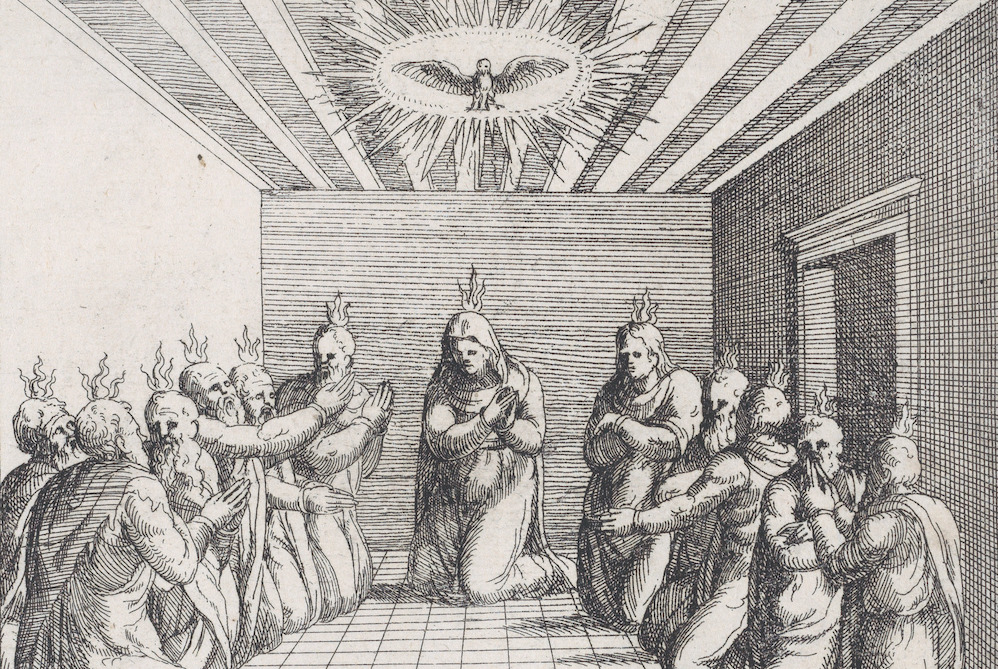
Detail of "Pentecost, from Old and New Testaments," etching by Augustin Hirschvogel, 1548 (Metropolitan Museum of Art, The Elisha Whittelsey Collection, The Elisha Whittelsey Fund, 1953)
The nightmare of COVID-19, a global pandemic which none of us has ever experienced in any of our lifetimes, has wreaked havoc on so many lives. Everywhere the same sign on businesses appears — "closed" — and the worldwide internet has never before had so much traffic with school lessons, meetings and work sessions all online. People everywhere continue to connect online with loved ones, business partners, friends and acquaintances near and far. International leaders try to work together; worldwide corporations in the public sector answer the clarion call for masks, ventilators and hospital beds. For once, the world's people have tried to unite in the common efforts of care and concern as death tolls rise amid frayed nerves and fears that have cut right into our cores, leaving us all to wonder what life is going to be like once COVID-19 ceases to dominate the face of the Earth.
COVID-19 has created gaping holes in the fabric of human life regardless of race, creed, economic and ethnic background, orientation, gender or class. Now a spirit of compassion, generosity, ingenuity, hospitality and creativity bonds the human species together, making us realize that despite our diversity and different social and geographical locations, we are all one in this common global pandemic experience.
This "oneness," however, experienced through this horrific pandemic is an invitation for the human community to reach deep within itself to discover what truly binds us one to another. Certainly, the bond is not COVID-19 but rather, the Spirit of the divine poured into all creation, all life, all people. This Sunday's readings shine a light on what truly joins us together as a gifted people. For Christians, Pentecost needs to be more than a liturgical feast; it is to be a way of life. Truly, all people are one in the One together and with the rest of creation, and that is the evangelizing word that Christians are called not only to proclaim but also to live out. Without this realization that we are all one, there can be no lasting peace which is the gift the Christ offers and waits for it to come to fruition.
Pentecost is the Greek name for the Israelite feast of Weeks and is the second of Israel's three classical pilgrim feast, specifically, Unleavened Bread/Passover, Weeks and Booths. Pentecost was originally an agricultural feast that celebrated the end of the grain harvest. Later it became associated with the giving of the law at Sinai. For Christians, Pentecost became known as the "birthday of the church." An earlier story in Genesis 11 describes a group of people scattered all over the Earth and speaking in different languages that none of them could understand. Here a group of Galileans are gathered in one place. They receive the gift of the Spirit; their language is diversified; and they proclaim the powerful deeds of the divine. Diversification, not commonality, becomes the source for understanding and the impetus for drawing people together. Diversity, rooted in the gift of the Spirit, becomes the foundation for unity.
The responsorial psalm contains an invitation to celebrate the power of the Spirit. This Spirit is not only part of the creative process but also imbued in all creation. If humans were to embrace fully the power and the gift of the Spirit, then every living being would be experiencing renewal and fecundity, the planet would be healing, and violence would cease once and for all.
Advertisement
The excerpt from 1 Corinthians is a stark reminder that diversity originates with the divine who is fully manifested in such diversity. The excerpt also sounds the trumpet against religious, ethnic and class discrimination. At the heart of all life is the Spirit, the gift already given, that has the power to draw all together into the One. Discrimination, isolation, alienation and separation indicate how out of touch we are spiritually and how deep our spiritual crisis truly is, especially among the hegemonic powers of our day.
Finally, the Gospel reminds us that the Spirit, in the form of the resurrected Christ, has the power to permeate locked doors, even the locked doors of our hearts. The gift of Easter and Pentecost, the gift of the Christ, is peace which is a gift of the Spirit. Peace, the hope of all creation, is the gift given, now waiting for humanity to bring it to fruition.
In sum, catastrophic events often unite people and can even bring out the best in them. No event, however, has the power to be as life sustaining and as life altering as the Spirit of which we have all been given to drink.
[Carol J. Dempsey is a Dominican Sister of Caldwell, New Jersey, and professor of biblical studies at the University of Portland, Oregon.]
